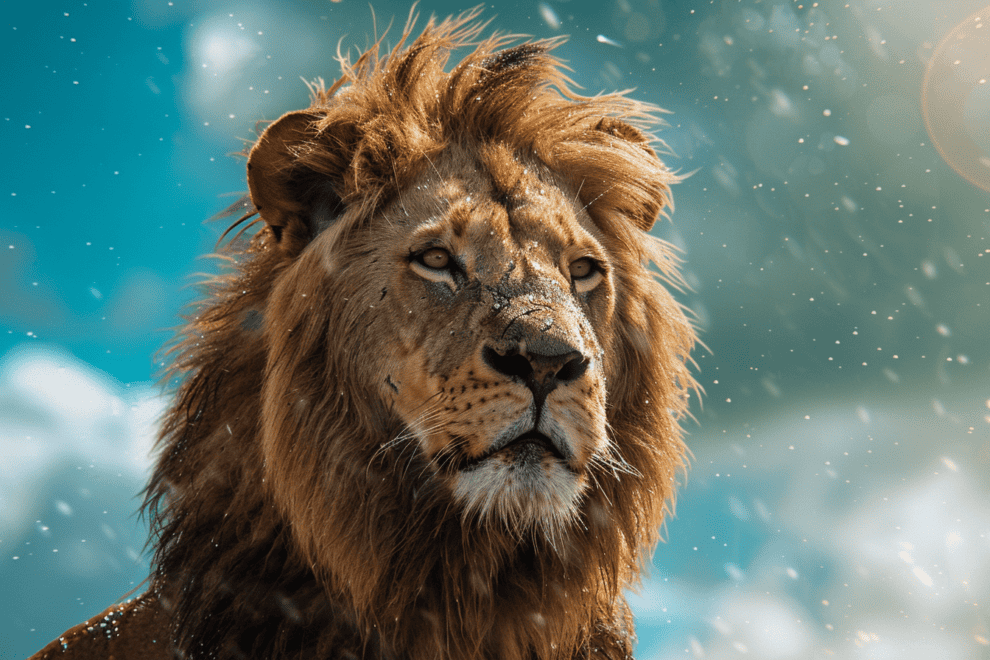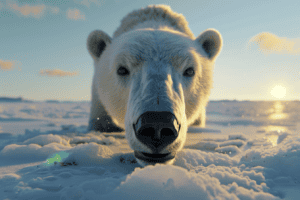Lions are known for their impressive hunting skills. But did you know that they also use bad weather to their advantage when hunting?
While most animals seek shelter during a storm, lions are one of the few predators that actively hunt in the rain.
This is because storms can create favorable conditions for the lions to catch their prey.
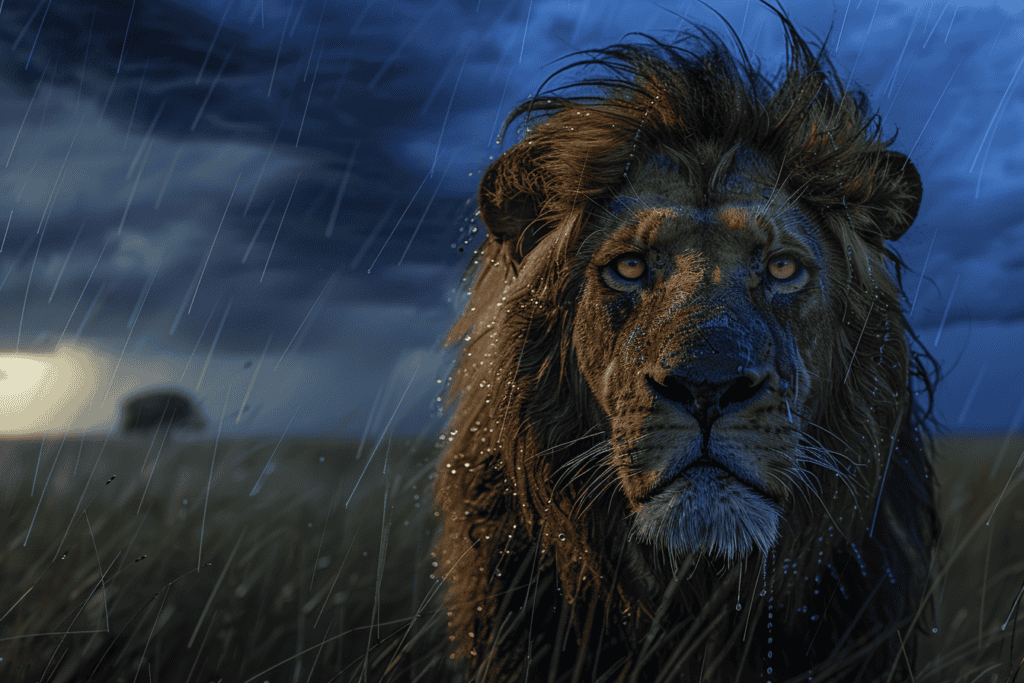
During a storm, the wind and rain can make it difficult for prey to hear and detect predators approaching. The sound of the rain can also mask the sound of the lion’s movements, making it easier for them to sneak up on their prey.
Additionally, the wet ground can make it harder for prey to run away quickly, giving the lions an advantage in catching them.
The Lion’s Hunting Ground: Setting the Stage
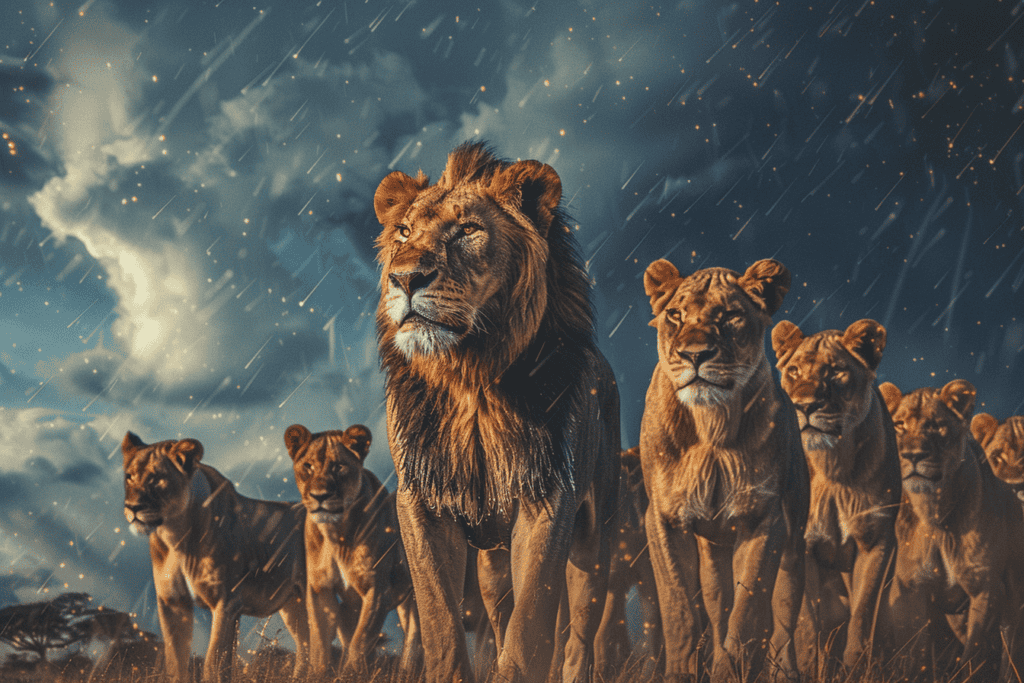
The African savannah is a vast expanse of grassland that spans across the continent of Africa. It is home to a diverse range of wildlife, including lions, buffalos, zebras, wildebeests, and giraffes.
The savannah is characterized by tall grass, scattered trees, and a few water sources. This unique ecosystem provides the perfect hunting ground for lions.
Lions are apex predators and are at the top of the food chain in the African savannah. They are well adapted to this environment, with sharp claws and powerful muscles that enable them to take down prey much larger than themselves.
Their tawny coat provides excellent camouflage in the tall grass, allowing them to stalk their prey undetected.
The Impact of Weather on Hunting
Weather plays a crucial role in lion hunting behavior. During the dry season, the grass in the savannah is shorter, making it easier for lions to spot their prey. However, during the wet season, the grass grows taller and thicker, making it more challenging for lions to hunt.
But, surprisingly, bad weather can actually work in the lion’s favor. When a storm is brewing, prey animals tend to huddle together for protection, making them easier targets for lions. The rain also makes it harder for prey to hear or smell approaching predators, giving lions the element of surprise.
Moreover, the tall grass in the African savannah also provides cover for lions to ambush their prey. Lions use their keen senses to identify and track their prey, and when the time is right, they pounce with lightning speed and precision.
Masters of Stealth: How Lions Hunt
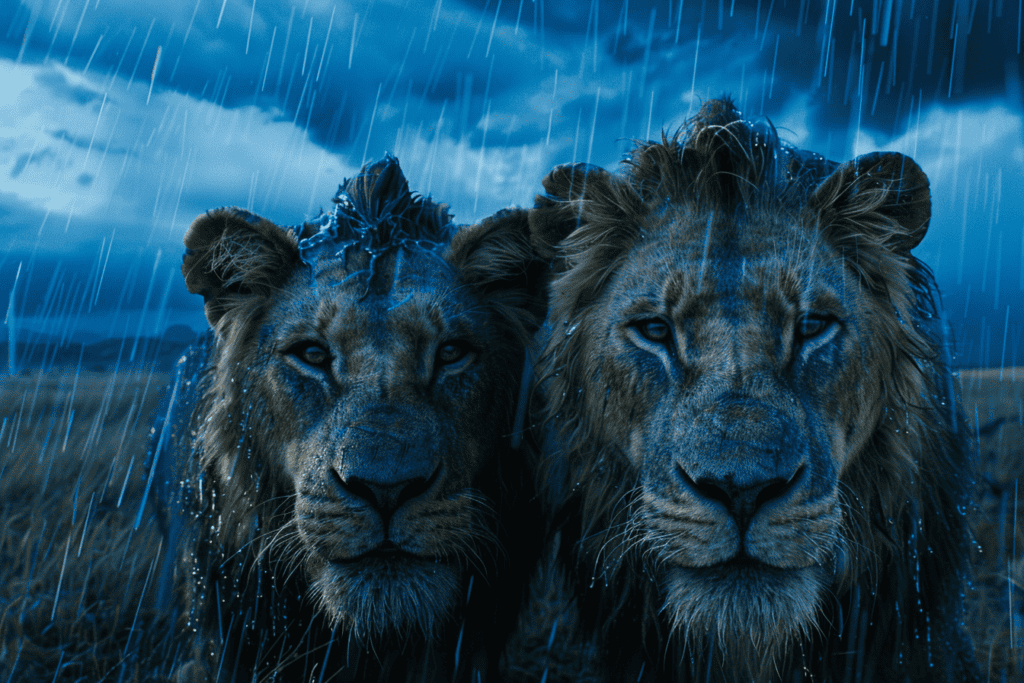
Lions are fascinating creatures that have evolved into efficient hunters that can take down prey much larger than themselves. Their hunting strategies are honed through experience and vital for their survival. In this section, we will explore how lions hunt and the techniques they use to capture their prey.
Lions are masters of stealth and can approach their prey without being noticed. They utilize tall grass and bushes to hide their approach and move quietly towards their target. Their agility and patience are key to their success in stalking prey.
Ambush: The Element of Surprise
Lions use ambush tactics to catch their prey off guard. They often hunt in groups, and each member of the pride has a specific role in the hunt. Lionesses are the primary hunters, and they work together to isolate a target before launching a coordinated attack.
The element of surprise is crucial to their success, and they rely on the cover of darkness or bad weather to launch their ambush.
Lions are also social animals that live in prides. Prides consist of several females and their cubs, as well as a few males.
The males’ primary role is to defend the pride and its territory, but they also play a crucial role in hunting. They work together with the females to take down larger prey, using their strength and powerful claws to overpower their target.
Adapting to the Challenge: Bad Weather Hunting Tactics

When the weather takes a turn for the worse, most animals retreat to their dens or hideaways to wait out the storm.
However, predators like lions know that bad weather can provide a unique opportunity to catch their prey off guard. In this section, we will explore how lions adapt their hunting tactics to take advantage of harsh weather conditions.
Lions are apex predators, and they have developed a range of hunting techniques to help them catch their prey. During bad weather, lions use their heightened senses to track down prey that are struggling to survive.
For example, during a thunderstorm, lions can use the sound of the rain to mask their movements and sneak up on unsuspecting prey. Similarly, the wind can help lions mask their scent and approach prey undetected.
Lions also take advantage of the reduced visibility caused by heavy rain or fog. During these conditions, prey animals are less likely to see or hear predators approaching, giving lions a better chance of making a successful kill.
Lions may also use the cover of darkness to their advantage, hunting under the cover of night during storms when prey animals are less likely to see them coming.
The Struggle for Prey During Harsh Conditions
While bad weather can give lions an advantage in hunting, it can also make it more challenging to catch their prey. During storms, prey animals may huddle together for warmth and protection, making it more difficult for lions to single out a target.
Additionally, larger prey animals like buffalo or wildebeest may be more difficult to take down during harsh weather conditions, as they are more likely to sense danger and take evasive action.
To overcome these challenges, lions may use different hunting techniques during bad weather. For example, instead of chasing down their prey, lions may rely on ambush tactics, waiting for prey animals to come to them. Alternatively, lions may work together in a coordinated attack, using their combined strength to take down larger prey animals.
Survival of the Fittest – The Role of Lions in the Ecosystem

Lions are apex predators, meaning they are at the top of the food chain. They play a crucial role in maintaining the balance of the ecosystem by controlling herbivore populations.
Without lions, herbivores would overgraze and destroy the vegetation, leading to a domino effect on the entire ecosystem.
Lions’ survival is essential for the ecosystem’s survival. Unfortunately, lions are facing numerous threats, such as habitat loss, poaching, and human-wildlife conflict.
It is crucial to protect these fascinating creatures and their habitats to ensure their survival and the ecosystem’s balance.
Fun Fact: Did you know that lions can go up to four days without drinking water? They get most of their water from the prey they eat.
Frequently Asked Questions
How do lions utilize inclement weather to their advantage during hunts?
Lions are known to hunt in all types of weather, including bad weather conditions such as rain and storms. In fact, lions can use bad weather to their advantage during hunts.
The sound of rain can help mask their movements, allowing them to approach their prey more stealthily. Additionally, the wet ground can make it harder for prey to hear their approach, giving lions a tactical edge.
What strategies do lions employ to successfully capture prey in the rain?
Lions employ a variety of hunting strategies to successfully capture prey in the rain. One strategy is to use the cover of bushes and trees to hide and ambush their prey. Another strategy is to hunt in groups, with each lion taking on a specific role in the hunt. Lions also use their keen senses of sight, hearing, and smell to locate prey in challenging weather conditions.
Can bad weather affect a lion’s hunting techniques, and if so, how?
Bad weather can certainly affect a lion’s hunting techniques.
Heavy rain or strong winds can make it more difficult for lions to hear or smell their prey.
Lions are highly adaptable and can adjust their hunting techniques to suit the weather conditions.
For example, during heavy rain, lions may rely more on their sense of sight to locate prey.
What adaptations do lions have that help them hunt in challenging weather conditions?
Lions have several adaptations that help them hunt in challenging weather conditions.
For example, they have excellent night vision, which allows them to hunt in low light conditions.
They also have powerful muscles and sharp claws that enable them to take down large prey, even in difficult terrain.
Additionally, lions have a thick fur coat that helps protect them from the elements.
How does a storm impact the behavior of animals that lions typically prey on?
A storm can impact the behavior of animals that lions typically prey on in several ways.
For example, heavy rain can make it harder for prey to hear or smell approaching predators, making them more vulnerable to attack.
Additionally, during a storm, prey may seek shelter, making them easier for lions to locate and hunt.
In what ways does a storm provide lions with a tactical edge over their prey?
A storm can provide lions with a tactical edge over their prey in several ways.
As mentioned earlier, the sound of rain can help mask their movements, allowing them to approach their prey more stealthily.
Additionally, the wet ground can make it harder for prey to hear their approach, giving lions a tactical advantage.
Finally, during a storm, prey may be more focused on seeking shelter than on avoiding predators, making them easier for lions to hunt.

